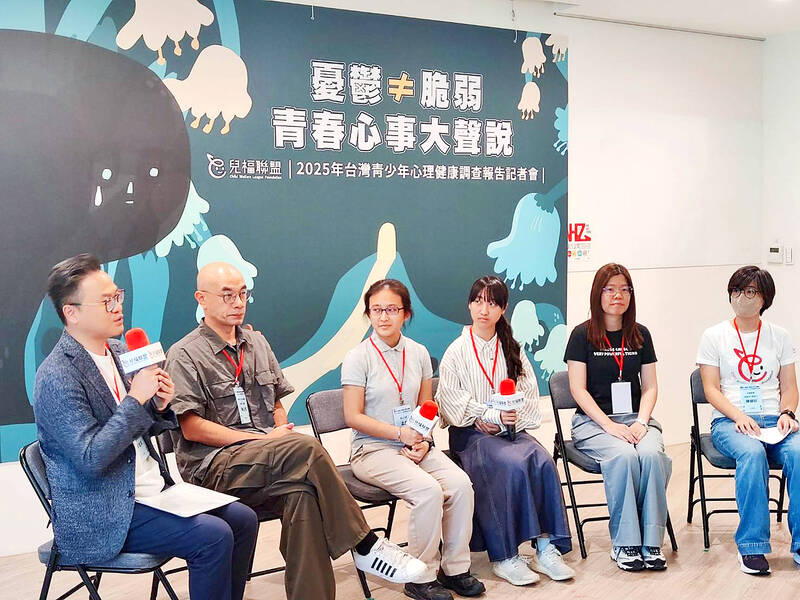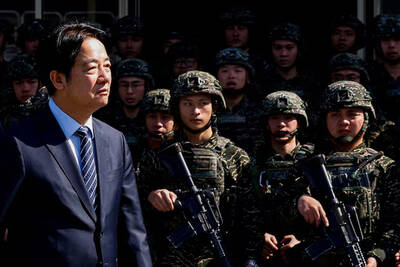More than one in five Taiwanese teenagers said they have had suicidal thoughts, with girls reporting stronger feelings than boys, according to a survey released yesterday by the Child Welfare League Foundation (CWLF).
On a five-point scale from “not at all” to “extremely,” 23.4 percent of female students who had suicidal thoughts said they were “moderately to extremely strong,” compared with 7.5 percent of male students, the CWLF said at a news conference.
The survey, conducted from May 27 to June 30, collected 7,007 valid responses from junior-high, high-school and vocational students across Taiwan. Of the respondents, 52.9 percent were female, 46.3 percent were male and 0.8 percent identified as other, the CWLF said.

Photo: CNA
The main sources of emotional distress included academic pressure, peer pressure, family stress and past trauma, with about 30 percent reporting moderate to extreme feelings of irritability, depression or inferiority, the CWLF said.
The foundation warned that emotional distress can cause sleep problems, with 47.9 percent of students reporting sleep deprivation, 46.6 percent having irregular sleep schedules, and 20.5 percent feeling reluctant to attend school two to three days per week.
Among students who sought help, 46.5 percent of students said they used generative artificial intelligence (AI), higher than those who turned to school counseling offices (41.1 percent) or mental health professionals (30.4 percent).
Although high-school students have been allowed to take mental health leave since August last year, more than 60 percent said they were unfamiliar with the rules, while nearly half of those who tried to use it reported obstacles from family members or school staff, the survey showed.
Li Hung-wen (李宏文) of the CWLF said the reliance on AI highlights the lack of access to official resources, urging the Ministry of Education to remove barriers for students seeking mental health leave.
Students in need of help can call the 1925 or 1995 hotlines for counseling.

The Taipei Mass Rapid Transit (MRT) Wanda-Zhonghe Line is 81.7 percent complete, with public opening targeted for the end of 2027, New Taipei City Mayor Hou You-yi (侯友宜) said today. Surrounding roads are to be open to the public by the end of next year, Hou said during an inspection of construction progress. The 9.5km line, featuring nine underground stations and one depot, is expected to connect Chiang Kai-shek Memorial Hall Station to Chukuang Station in New Taipei City’s Jhonghe District (中和). All 18 tunnels for the line are complete, while the main structures of the stations and depot are mostly finished, he

The first global hotel Keys Selection by the Michelin Guide includes four hotels in Taiwan, Michelin announced yesterday. All four received the “Michelin One Key,” indicating guests are to experience a “very special stay” at any of the locations as the establishments are “a true gem with personality. Service always goes the extra mile, and the hotel provides much more than others in its price range.” Of the four hotels, three are located in Taipei and one in Taichung. In Taipei, the One Key accolades were awarded to the Capella Taipei, Kimpton Da An Taipei and Mandarin Oriental Taipei. Capella Taipei was described by

Minister of Economic Affairs Kung Ming-hsin (龔明鑫) yesterday said that private-sector refiners are willing to stop buying Russian naphtha should the EU ask them to, after a group of non-governmental organizations, including the Centre for Research on Energy and Clean Air (CREA), criticized the nation’s continued business with the country. While Taiwan joined the US and its Western allies in putting broad sanctions on Russia after it invaded Ukraine in 2022, it did not explicitly ban imports of naphtha, a major hard-currency earner for Russia. While state-owned firms stopped importing Russian oil in 2023, there is no restriction on private companies to

President William Lai (賴清德) is expected to announce a new advanced “all-domain” air defense system to better defend against China when he gives his keynote national day speech today, four sources familiar with the matter said. Taiwan is ramping up defense spending and modernizing its armed forces, but faces a China that has a far larger military and is adding its own advanced new weapons such as stealth fighter jets, aircraft carriers and a huge array of missiles. Lai is expected to announce the air defense system dubbed “Taiwan Dome” in his speech this morning, one of the sources said. The system